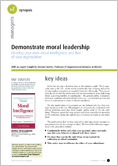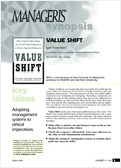Corporate governance

The future of work: seven mutations to anticipate
The Covid-19 crisis will probably engender deep and irreversible changes in the organization of companies. How can you accompany this transformation of the world of work to draw a desirable future?

Innovate like a start-up
The rise in power of digital innovations is often perceived as a threat for the established players. Against start-ups, how can they reinvent themselves to win the race for innovation?

Implementing a successful reorganization
In a context of permanent change, companies need to reorganize frequently—but results are rarely satisfying. How can you maximize your chances of success in a reorganization initiative?

Successfully transitioning to the self-managed enterprise
While the ”liberated company” model provides a solution to agility challenges, it involves a real disruption in organizing the relationships among employees. What does it take to achieve such a radical change?

Break down organizational silos
“Siloed” organizations, which used to be highly effective, prove less relevant in today’s complex environments. How can we avoid the downside of an organizational model in which we had previously found so many qualities?

Secure your strategic decisions
Many decision-making errors derive from reflexes that lead to form a truncated view of reality. How can we avoid this risk? By engaging in debate that allows us to confront different viewpoints.

Demonstrate moral leadership
To address the growing call for ethical behavior, managers must not only develop their own moral intelligence, but also be able to influence the behavior of their subordinates.

Choose your ethical positioning
Good ethical conduct is a now obligatory. But what kinds of commitments should companies make? And how to adapt management systems to ensure compliance with ethical commitments?

